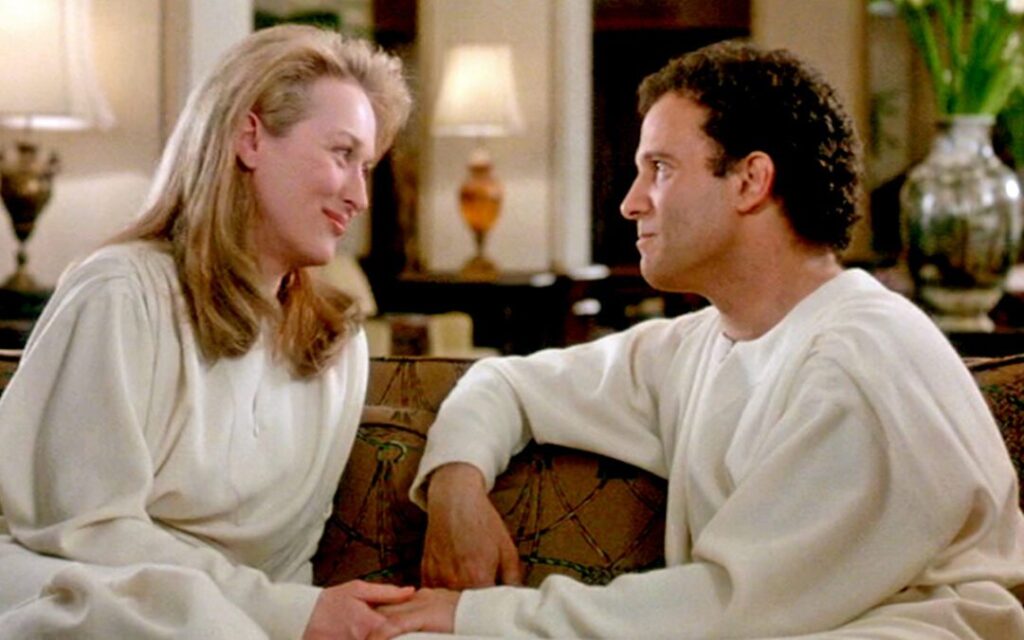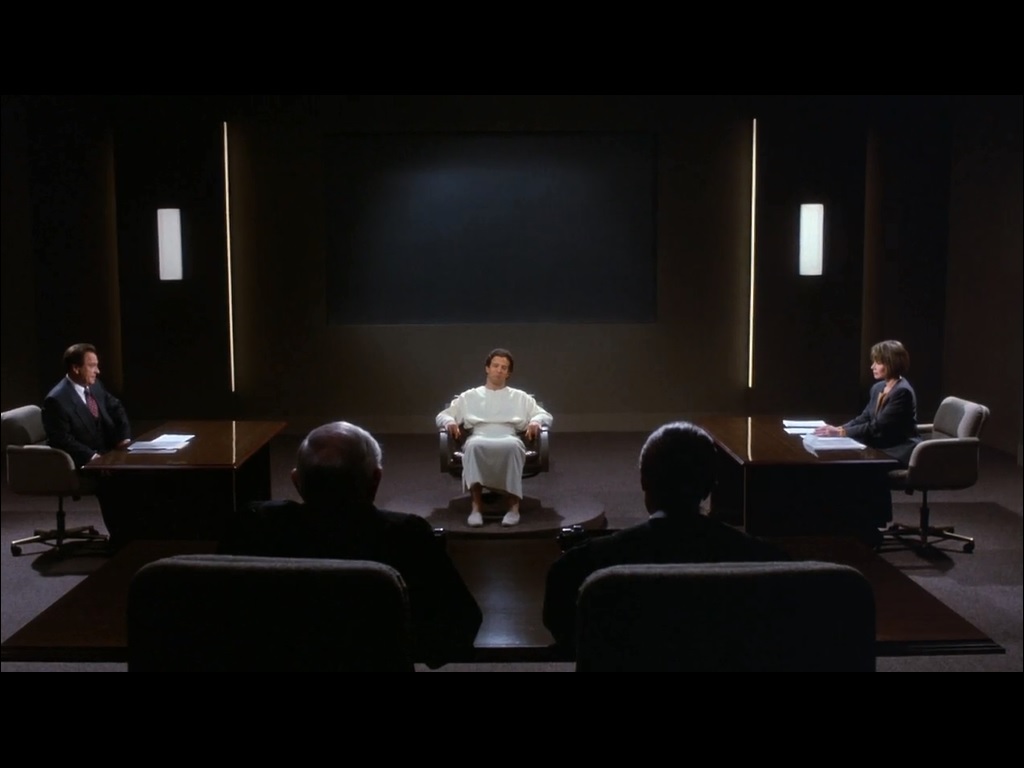
Defending Your Life is a comedy, but this doesn’t mean it should be taken lightly. A vision of the afterlife that ponders the nature of existence and what the sum of all our days might finally amount to, it suggests there is a fate even worse than death: never having truly lived.
Daniel Miller (Albert Brooks) is content with his life, a carefully circumscribed existence that includes a well-paid job and not much else. It’s his birthday and he intends to celebrate by going for a long drive, alone, in the brand-new BMW he’s bought himself as a gift. He isn’t lonely; he just prefers the simplicity of solitude. Speeding forward in his new convertible, Daniel sings along to ‘Something’s Coming’ from West Side Story, blithely unaware that something is indeed coming: a fatal encounter with a bus which shunts him straight to the hereafter.
The afterlife as imagined by Brooks—he wrote and directed as well as starred in the film—defies expectations. Of course it does. Brooks’ famous routines include one where he plays a mime who won’t stop talking and another in which he demonstrates how specific food spontaneously grants you the ability to impersonate celebrities. His version of the next world is decidedly secular; there are no pearly gates, or even fluffy clouds. Instead everything is dizzyingly mundane. A relay of hospital orderlies, tour guides and hotel staff processes the near-catatonic arrivals with calm efficiency, conveying them first in endless rows of wheelchairs, then herding them onto buses for a guided welcome to their new surroundings. Everything is designed to look as familiar as possible. That’s what makes this world so funny and so disorienting.
Daniel is shown to his designated hotel room and—still too traumatized to speak or have full control over his limbs—fumbles in his pockets for change to tip his porter, a move so darkly comic yet sweet that the man kindly tells him it would be surprising if Daniel found anything, but he appreciates the gesture. The next morning Daniel discovers there are perks to his status: food of any and every description is available in abundance, arrives almost instantly and is the most delicious he’s ever tasted. It is (quite literally) to die for.
But just because he’s dead doesn’t mean his troubles are over. Daniel is in Judgement City, a form of purgatory, and is assigned a defence lawyer, Bob Diamond (Rip Torn), who informs him that he will be defending Daniel’s life at a trial to decide whether he’s earned the right to move on to the next plane of existence or must return to Earth, reincarnated, to try again. Meanwhile, he meets another new arrival, Julia (Meryl Streep), and falls in love. If he doesn’t win his case he won’t just be sent back to Earth, he’ll also lose Julia forever.

What lies in the hereafter? The Ancient Egyptians believed the god Anubis judged souls by weighing the hearts of the deceased against a feather. If your heart was heavier than the feather, your soul would be devoured; if it was lighter, you would be admitted to heaven.
Defending Your Life is Brooks’ answer to the eternal question and it’s filled with wry humour, as well as philosophical concepts that are quietly, staggeringly profound. Most notable is his belief in the importance of self-examination, which Judgement City’s trial system is built around. Each trial is carried out with a prosecutor, defence attorney and judges but none of them serve a deity; they serve the universe. They are also implied to have once been where Daniel is now. This opens up intriguing possibilities about spiritual evolution, including that the souls on trial are at the mercy of beings who were once like them, but are now beyond their understanding.
Daniel’s life is subject to the minutest scrutiny not to determine if he was a good man. Instead, he’s on trial for fear. Fear of risk, of retribution, of love. Only those who have conquered their fears are worthy of moving on.
It’s no wonder he begins to feel small. Brooks’ performance is deeply humane, a portrait of an ordinary man forced to confront a litany of mistakes with no self-justifications to shield him. He shows us Daniel’s indignation, vulnerability and self-doubt, as well as pain so achingly raw you feel almost compelled to look away.
And through it all, he keeps making us laugh. In fact it’s Daniel’s humour that draws Julia to him. In many ways she’s his opposite: carefree, spontaneous and despite her protestations, pretty much perfect. Brooks rewrote the part with Meryl Streep in mind and it’s clear how much fun she has with the role, imbuing Julia with an infectious joie de vivre. To paraphrase one of Brooks’ lines, the chemistry between him and Streep feels effortless, convincing us that over the span of just a handful of days two people have fallen deeply, irrevocably in love.
Defending Your Life is unique—a heartbreaking, hilarious contemplation of what makes us human. It decries complacency, daring us to live braver, more compassionate lives. Even in death, it’s never too late to start living.
Leave a Reply